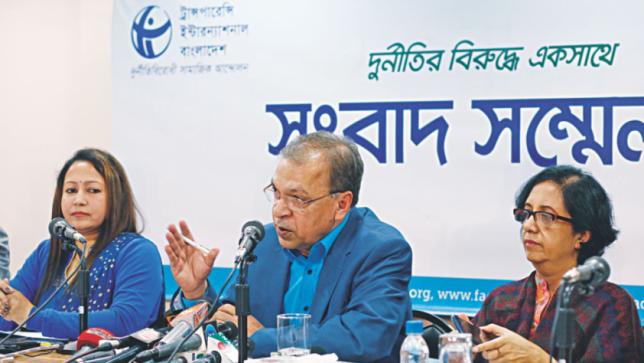Tea workers deprived of proper wages: TIB

Development remains a far cry for tea workers whom garden owners still deprive of proper wages and basic necessities while trampling on their dignity, said Transparency International Bangladesh (TIB) yesterday.
Labour laws and regulations, alongside the gardens' job contracts, stipulate that the owners are to provide all basic necessities to the workers.
The Berlin-based organisation presented a research paper on “Working Environment & Worker's Right in Tea Garden: Governance Challenges and Way Forward” through a press conference at its Dhaka office.
The research data was derived from permanent workers of 64 gardens between August 2017 and May 2018. There are 156 gardens registered in Bangladesh.
The TIB found the wages of tea workers to be the lowest amongst those in all of the industries. The highest monthly wage was Tk 5,231 while non-permanent workers got less than what their permanent peers got.
In contrast, the minimum wage was the highest for workers in the ship breaking industry (Tk 16,000), followed by tannery (Tk 12,800), aluminium (Tk 8,700), pharmaceuticals (Tk 8,050), readymade garments (Tk 8,000), tea packaging (Tk 7,080), saw mills (Tk 6,850), bakery (Tk 5,940), automobile (Tk 5,930) and cotton (Tk 5,710).
The research paper says the tea workers cannot put on any form of headwear in front of garden managers, assistant managers and heads of panchayets (village councils).
People who hold these three posts sometimes even go as far as ordering tea workers to come and take off their shoes.
Dr Iftekharuzzaman, TIB executive director, said he could not term tea workers' work environment and living standards as that of slavery as labour rules and regulations now exist, something not available when the subjugation was in practice in the past.
It is the “next generation” of what slavery was, he said.
The British created the practice of slavery among tea workers and though their situation slightly developed, it is still far behind that in other professions, he added. “This is a serious, concerning thing,” he said. The research shows that no garden had set up tube wells or any permanent system for availing drinking water as well as an adequate number of toilets for workers.
Some 60.9 percent of tea workers set up tube wells for themselves using their own money or with assistance from non-government organisations or union parishads.
According to the research, 72.5 percent of tea workers drink water from tube wells and 16.1 percent from ring wells.
Moreover the management does not provide any cup at the wells in the garden and so the workers make-do with their hands. When it comes to electricity, some garden owners do not even make connections available in workers' houses. The 48.4 percent that do so refrain from bearing the bills.
The situation prompted 27.9 percent of workers to depend on kerosene to light their houses. Regarding healthcare, the research says 11 of the 64 gardens did not set up any health centre or dispensary. Around 61.7 percent of workers said they had to purchase medicine from outside the gardens while 79.1 percent said owners did not provide the money.
The TIB found that 11.6 percent of permanent workers were left out of the provident fund facility while only seven out of the 64 gardens had day-care centres for workers' children.
The Department of Inspection for Factories and Establishments is supposed to conduct investigations to ensure labour rights but they are involved in corruption and so deprivation of tea workers continues, said Dipu Roy, documentation associate of the TIB. Presenting the research paper, she said the government should take steps to ensure that the wages were adequate alongside quality healthcare and education.
In an email to The Daily Star yesterday, Bangladesh Tea Association said 90 percent tea workers are being paid in cash and kind about Tk 11,367 per month (those who work in the fields) and 10 percent tea workers are being paid about Tk 10,407 per month (those who work in the tea factories).
